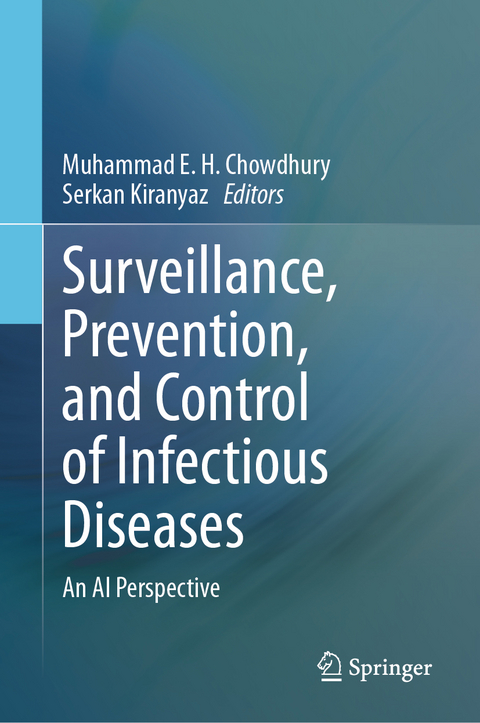
Surveillance, Prevention, and Control of Infectious Diseases
Springer International Publishing (Verlag)
978-3-031-59966-8 (ISBN)
This is a pioneering book that delves into the intersection of artificial intelligence (AI) and healthcare, specifically focusing on the detection and prevention of infectious diseases. Authored by leading experts in the field, this book offers a comprehensive overview of the latest advancements, challenges, and applications of AI in combating infectious diseases. With a unique emphasis on big data, wearable data, and computer vision, the book presents original research works that showcase innovative approaches to leveraging AI for disease surveillance, screening, and severity stratification.
Through a combination of review chapters summarizing the current state of the field and novel applications of AI technology, readers gain valuable insights into the potential of AI in addressing major life-threatening infectious diseases identified by the UN Sustainable Development Goal 3. The book's structure ensures a balanced blend of theoretical foundations and practical applications, making it accessible to both researchers and healthcare professionals. By exploring cutting-edge methodologies and case studies, the book equips readers with the knowledge and tools needed to harness the power of AI in the fight against infectious diseases, ultimately contributing to global efforts to improve public health outcomes.
With its interdisciplinary approach and focus on AI-driven solutions, " Surveillance, prevention, and control of infectious diseases: An AI perspective" serves as an invaluable resource for researchers, practitioners, and policymakers seeking to stay abreast of the latest developments in this rapidly evolving field. Whether exploring the role of wearable devices in disease monitoring or examining the potential of computer vision for early detection, this book offers a comprehensive overview of AI applications that have the potential to revolutionize infectious disease management and prevention strategies.
Muhammad E. H. Chowdhury (Senior Member, IEEE) received his Ph.D. degree from the University of Nottingham, U.K., in 2014. He worked as a Postdoctoral Research Fellow at the Sir Peter Mansfield Imaging Centre, University of Nottingham. He is currently working as an Assistant Professor and program coordinator of the Department of Electrical Engineering, Qatar University. He has filed several patents and published 200+ peer-reviewed journal articles, 30+ conference papers, and several book chapters. His current research interests include biomedical instrumentation, signal processing, wearable sensors, medical image analysis, machine learning and computer vision, embedded system design, and simultaneous EEG/fMRI. He is currently running NPRP, UREP, and HSREP grants from Qatar National Research Fund (QNRF) and internal grants (IRCC and HIG) from Qatar University along with academic projects from HBKU and HMC. He is a Senior Member of IEEE. He has served as Guest Editor for Polymers, an Associate Editor for IEEE Access and a Topic Editor and Review Editor for Frontiers in Neuroscience. He has won the COVID-19 Dataset Award, AHS Award from HMC and National AI Competition awards for his contribution to the fight against COVID-19. His team is the gold-medalist in the 13th International Invention Fair in the Middle East (IIFME). He has been listed among the Top 2% of scientists in the World List, published by Stanford University. Serkan Kiranyaz (Senior Member, IEEE) was born in Türkiye in 1972. He received the B.S. and M.S. degrees in signal processing and machine learning from Electrical and Electronics Department, Bilkent University, Ankara, Türkiye, in 1994 and 1996, respectively, and the Ph.D. degree in signal processing and Docency degree in signal processing and machine learning from the Institute of Signal Processing, Tampere University of Technology, Tampere, Finland, in 2005 and 2007, respectively. From 2009 to 2015, he was a Professor with Signal Processing Department, Tampere University of Technology. He is currently a Professor with Qatar University, Doha, Qatar. He has noteworthy expertise and background in various signal processing domains. He is rigorously aiming for reinventing the ways in novel signal processing paradigms, enriching them with new approaches, especially in machine intelligence, and revolutionizing the means of “learn-to-process” signals. He made significant contributions to bio-signal analysis, particularly EEG and ECG analysis and processing, classification and segmentation, computer vision with applications to recognition, classification, multimedia retrieval, evolving systems and evolutionary machine learning, swarm intelligence and evolutionary optimization. He has authored or coauthored two books, seven book chapters, ten patents/applications, more than 100 journal articles in several IEEE transactions and other high-impact journals, and more than 120 papers in international conferences. His research interests include learning and signal processing. Dr. Kiranyaz was a PI and LPI in several national and international projects.
Introduction.- Philosophical and Mathematical Background.- Axioms of Soft Logic.- Soft Numbers.- The Soft Coordinate System.- Soft Logic and Calculus.- Soft Curves.- The Dynamics of Soft Logic.- Soft Analysis.- Limits of Soft Numbers.- The Soft Mobius Function and the Riemann Hypothesis.- Soft Probability and Entropy.- Soft Logic and the Privacy Paradox.- Application Examples and Further Research.
| Erscheinungsdatum | 02.07.2024 |
|---|---|
| Zusatzinfo | XII, 240 p. 66 illus., 61 illus. in color. |
| Verlagsort | Cham |
| Sprache | englisch |
| Maße | 155 x 235 mm |
| Themenwelt | Informatik ► Theorie / Studium ► Künstliche Intelligenz / Robotik |
| Studium ► 2. Studienabschnitt (Klinik) ► Anamnese / Körperliche Untersuchung | |
| Studium ► Querschnittsbereiche ► Epidemiologie / Med. Biometrie | |
| Schlagworte | Artificial Intelligence • Big Data • challenges • computer vision • Dengue management system • Infectious Diseases • Malaria • Physiological Monitoring • Prevention and Control • Prospects • Surveillance • Tuberculosis • Vaccine • Wearables |
| ISBN-10 | 3-031-59966-7 / 3031599667 |
| ISBN-13 | 978-3-031-59966-8 / 9783031599668 |
| Zustand | Neuware |
| Informationen gemäß Produktsicherheitsverordnung (GPSR) | |
| Haben Sie eine Frage zum Produkt? |
aus dem Bereich


